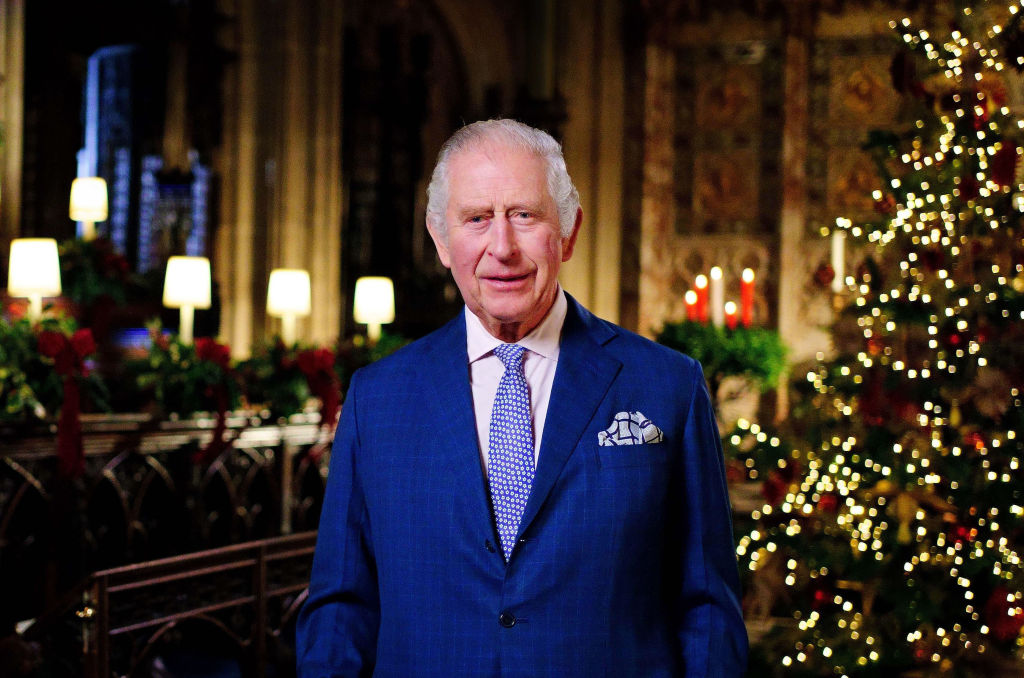Today, shortly before 3 p.m., there will be a collective heave as backsides – weighed down from turkey and roast potatoes – are prised from dining chairs and plonked on to sofas to tune into the King’s speech. So I very much hope. For the royal Christmas broadcast is important, and this year’s of course marks a new era.
This afternoon our televisions will bring us not only the first Christmas message from the new King, but indeed the first from any King. For while the tradition of the Christmas message began in 1932 under King George V, the first Christmas broadcast to be televised was not until 1957, and that of course was by Queen Elizabeth II. In the build-up to this year’s broadcast there has been much speculation about content: about what the King might say about Harry and Meghan, and – more importantly – about the late Queen, about his coronation in May and possible indications of his vision for his reign.
The idea of the Christmas broadcast was first proposed by Lord Reith in 1922. It eventually materialised a decade later, delivered to inaugurate the BBC’s Empire Service (now the World Service). The first broadcast was written by Rudyard Kipling. The late Queen wrote much of her messages herself, with assistance from Prince Philip and officials. The themes have often stayed constant. This year, with war in Ukraine, matters of war and peace may feature as they have many times in years past.
There is poignancy in recalling the late Queen’s words from last year’s broadcast, in the aftermath of the Duke of Edinburgh’s death, where she remarked upon the ‘one familiar laugh missing this year’
This year the Queen’s shadow will of course loom large. Her Christmas broadcast in 2012 was the first to be recorded in 3D, a special innovation for her Diamond Jubilee year. In her Platinum Jubilee year, the baton has been passed. There is poignancy in recalling her words from last year’s broadcast, in the aftermath of the Duke of Edinburgh’s death, where she remarked upon the ‘one familiar laugh missing this year’. There will be another laugh missing this year for the King and the rest of the royal family. And as we watch, many of us will feel the sorrow of her passing once more.
The power of the Christmas broadcast lies in its intimacy; its direct transmission to each of us in our own homes. The technology that enables that was reflected upon in the first broadcast (by radio), when George V addressed himself ‘To men and women so cut off by the snows, the desert or the sea, that only voices out of the air can reach them’. It is that same sentiment, of crossing into our homes to speak to us as subjects directly, that was expressed perhaps most famously by George VI on the outbreak of war in 1939, when he delivered a message ‘spoken with the same depth of feeling for each one of you as if I were able to cross your threshold and speak to you myself’.
Why does the Christmas broadcast matter? Of course the monarch seeks to unite us as a country. And from the outset the broadcast has sought also to bring the Commonwealth together, and is eagerly listened to still from Malta to Malaysia to the Maldives. Speaking personally, I find it also a moment to reflect on the year just gone; with all the noise of 24-hour news stripped away, one can see the most important events of the year more clearly. As delivered by Queen Elizabeth, the broadcast felt also a chance to receive some gentle guidance. Not hectoring, but occasional words of wisdom from an elder, offered with an encouraging smile. Present challenges can be set in a historical context, as the late Queen did in 2011 when she said that ‘it is through this lens of history that we should view the conflicts of today, and so give us hope for tomorrow’.
Of course the broadcast can, however briefly, bring the family together, a brief respite from bickering over the choice of Christmas movie, and that can only be a good thing. But there is something else besides: in a country where regular church attendance is now around just 5 per cent, the Queen’s Christmas broadcasts were, for most people, perhaps the only time in the year when they heard spoken any sort of Christian reflection. They were never a sermon, but there were elements of a sermonic style. Her late Majesty’s simple insights from the nativity story and the life of Jesus – reflections which became more common after 2000 – spoken by someone who so clearly felt her life enriched by her faith, seemed to me all the more important for their vanishing rarity in modern society.
Come 3 p.m. today, it shall not matter whether lunch is running late or Strictly starting early. As a family we shall tune in to watch the King. And I shall do so knowing that the world over, across the Commonwealth where there exists – let us be in no doubt – deep reserves of genuine pride and fellow-feeling at membership of this family of nations, many others will be doing just the same.






Comments